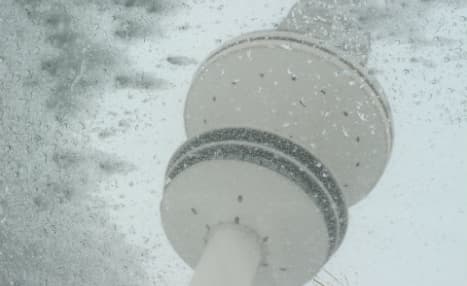Snow in early November. Will this winter be ice cold?

With 20cm of snow already lying on the ground in parts of northern Germany, winter has bitten early. But meteorologists say it probably won't last.
In Lower Saxony and along the Baltic coast, 20cm of snow has fallen in recent days, with temperatures plummeting to -16C overnight on Wednesday.
Andreas Friedrich, spokesperson for the German Weather Service (DWD), says that snowfall so early in the lower regions of Germany is unusual.
While in the Alpine regions it is normal to see snowfall earlier in November “in the low-lying plains the snow usually comes at the end of the month,” he says.
“What we have seen in Lower Saxony, where huge amounts of snow have fallen, is very unusual for November and happens at most once every ten years.”
But Friedrich cautions that a cold November does not say anything about how the rest of the winter will pan out.
He explains that the DWD uses modelling systems to work out weather trends for the upcoming seasons.
“With these we can see whether it is statistically likely that the season will be warmer or colder in comparison with the previous 30 years,” Friedrich says, adding that winter 2016-17 is expected to be somewhat mild in historical comparison.
“But this is a statement which has only a very limited use to the wider public. You can’t tell from this assessment when in the winter it will turn cold. With a long-term forecast, you can’t plan anything exactly.”
As for whether we are likely to have a white Christmas in the Bundesrepublik, the weatherman says that it is way too early to tell.
“It feels like I start hearing this question in September every year!” he says. “At the very earliest we will be able to give an assessment in the middle of December on whether snow is likely over the festive period.”
But even then, the sky readers are only right 65 to 75 percent of the time.
“If the weather conditions are very difficult, it is often only possible to tell one or two days beforehand whether fresh snow will fall on Christmas,” says Friedrich.
“Particularly in the chaotic weather system of central Europe, it is very hard to read the tea leaves.”
The weatherman has his own suggestion for those who want a guarantee of a white Christmas.
“On Zugspitze [Germany’s highest mountain] there had been snow on the 3,000-metre summit since we have started recording it. Whoever simply must have snow on Christmas should head for Zugspitze or other Alpine peaks over 2,000 metres."
Comments
See Also
In Lower Saxony and along the Baltic coast, 20cm of snow has fallen in recent days, with temperatures plummeting to -16C overnight on Wednesday.
While in the Alpine regions it is normal to see snowfall earlier in November “in the low-lying plains the snow usually comes at the end of the month,” he says.
“What we have seen in Lower Saxony, where huge amounts of snow have fallen, is very unusual for November and happens at most once every ten years.”
But Friedrich cautions that a cold November does not say anything about how the rest of the winter will pan out.
He explains that the DWD uses modelling systems to work out weather trends for the upcoming seasons.
“With these we can see whether it is statistically likely that the season will be warmer or colder in comparison with the previous 30 years,” Friedrich says, adding that winter 2016-17 is expected to be somewhat mild in historical comparison.
“But this is a statement which has only a very limited use to the wider public. You can’t tell from this assessment when in the winter it will turn cold. With a long-term forecast, you can’t plan anything exactly.”
As for whether we are likely to have a white Christmas in the Bundesrepublik, the weatherman says that it is way too early to tell.
“It feels like I start hearing this question in September every year!” he says. “At the very earliest we will be able to give an assessment in the middle of December on whether snow is likely over the festive period.”
But even then, the sky readers are only right 65 to 75 percent of the time.
“If the weather conditions are very difficult, it is often only possible to tell one or two days beforehand whether fresh snow will fall on Christmas,” says Friedrich.
“Particularly in the chaotic weather system of central Europe, it is very hard to read the tea leaves.”
The weatherman has his own suggestion for those who want a guarantee of a white Christmas.
“On Zugspitze [Germany’s highest mountain] there had been snow on the 3,000-metre summit since we have started recording it. Whoever simply must have snow on Christmas should head for Zugspitze or other Alpine peaks over 2,000 metres."
Join the conversation in our comments section below. Share your own views and experience and if you have a question or suggestion for our journalists then email us at [email protected].
Please keep comments civil, constructive and on topic – and make sure to read our terms of use before getting involved.
Please log in here to leave a comment.